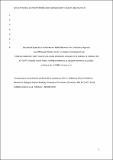Educational expectations and adolescent health behaviour : an evolutionary approach
Abstract
Objectives. Previous research finds adolescents expecting to attend university are more likely to demonstrate health-promoting behaviour than those not expecting university attendance. This suggests public health improvements may be achievable by encouraging adolescents to adopt academic goals. We investigate confounders of this putative relationship, focusing on those identified by evolutionary theory. Methods. Multi-level logistic regression was used to analyse the 2010 Scottish Health Behaviour in School-aged Children survey (n = 1834). Results. Adolescents anticipating university attendance exhibited higher levels of engagement in health-protective behaviours (fruit and vegetable consumption, exercise and tooth brushing) and were more likely to avoid health-damaging behaviours (crisps, soft drink and alcohol consumption, tobacco and cannabis use, fighting and intercourse). These relationships persisted when controlling indicators of life history trajectory (pubertal timing, socioeconomic status and father absence). Pupil level: gender, age, perceived academic achievement and peer/family communication and school level: university expectations, affluence, leavers’ destinations, exam performance and school climate were also adjusted. Conclusions. Encouraging adolescents to consider an academic future may achieve public health benefits, despite social factors that might otherwise precipitate poor health via an accelerated life history trajectory.
Citation
Whitehead , R D , Currie , D B , Inchley , J & Currie , C 2015 , ' Educational expectations and adolescent health behaviour : an evolutionary approach ' , International Journal of Public Health , vol. 60 , no. 5 , pp. 599-608 . https://doi.org/10.1007/s00038-015-0692-9
Publication
International Journal of Public Health
Status
Peer reviewed
ISSN
1661-8556Type
Journal article
Description
This research was funded by NHS Health Scotland.Collections
Items in the St Andrews Research Repository are protected by copyright, with all rights reserved, unless otherwise indicated.

